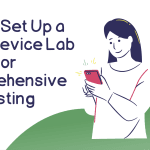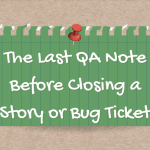Going to an interview is not easy, no matter which position you applied for. Most people are nervous and afraid and always think about what questions will be asked, how the interview will go, whether there will be a job offer, etc. It is especially stressful for beginners without any prior experience.
But, don’t worry, if you have applied for a junior QA position and don’t have any prior experience, you can still shine on your first interview and get the job you want. Keep in mind that the interviewers are aware that for the entry QA positions, there will be candidates without any prior experience, and in this kind of situation, it is more important for a person to show good mindset, attention to detail, problem-solving skills, communication, and a willingness to learn.
In this blog post, we will go step by step in the process of interview preparation that will help you shine on that upcoming interview.

Understand the QA Role
Before you go to the interview, you need to understand the QA role. Read about the QA role, why it is important, what are the tasks that QA is working on during day-to-day work, how the QA incorporates in the software development teams, etc. Learn about what kind of software development methodologies exist, especially focusing on the Agile methodology. Have an understanding of the Software Development Lifecycle, different types of testing (functional, non-functional, regression, integration, etc.), etc.
You need to have theoretical knowledge about what the QA is doing, why the QA role is important, and what the software development process looks like.
Learn About the Basic Testing Concepts
Even though you don’t have any prior experience, you still need to have an understanding of the basic testing concepts and terminology.
Read about test scenarios, test cases, test plan, how to report a bug ticket, how to communicate with the developers, the difference between functional and non-functional testing, regression testing, smoke testing, sanity testing, etc.
Knowing this terminology and the basic testing principles will help you a lot during the interview and will give you the answers to a lot of the questions that the interviewer will ask you.
Practice Your Problem-Solving Skills
Being able to discuss real-world examples where you will show your problem-solving skills can help you in the interview process. Before the interview, think about some examples, like:
- If you find a bug during the testing process, what would you do, how would you react?
- What will you do if you find a bug that you can not reproduce? (You can read more about this here)
- How will you handle a situation where a developer disagrees with your reported bug?
- Imagine that you have a tight deadline and you don’t have time to test everything, how will you approach the testing?
- How will you test a user story that has no written requirements or the requirements are not completed? (You can read more about this here)
Learn About the Basic Tools
Even though the interview is for an entry QA position and you don’t have any prior experience, you still need to know the basic tools. For example, JIRA for project management and bug tracking, Selenium or Cypress for UI Testing, and Postman for API testing.
Learn about these basic tools so you are familiar with them in the interview. Even if you haven’t used them a lot, have some basic knowledge about them and their purpose, and show that you want to learn them and that you are interested in them.
Show Enthusiasm and Willingness to Learn
It is very important to be interested in the position that you are applying for and to be willing to learn more about it so you can succeed in the job position for which you are applying. If you have that passion and curiosity, show that during the interview. Show the interviewer that you are passionate about the job position, show initiative, show that you are willing to learn, be curious, and ask about the company’s QA process, tools, and challenges.
Soft Skills are Equally Important
As I said in one of my previous blog posts, soft skills are equally important for QA, as technical skills. Communication, collaboration, critical thinking, adaptability, and time management are very important skills for every QA professional. Practice these skills and highlight them during the interview.
Prepare Questions for the Interviewer
Usually, at the end of the interview, the interviewer will ask you do you want to ask something. Always have some questions prepared that will show that you’re engaged and interested in the role. You can ask something like:
- What does the onboarding process look like for new QA team members?
- What types of testing are prioritized in your QA process (e.g., manual, automated, performance, security)?
- Can you tell me about the tools and technologies your QA team currently uses?
- What kind of training or development opportunities are available for the QA team?
- What are the most important qualities you look for in a QA engineer, especially for someone starting?
- What’s a typical day like for a QA engineer on your team?
- Can you provide an example of a project or task that a beginner QA might work on initially?
The interviews are challenging and it is normal to be nervous, but keep in mind that it is just a conversation where you can show your knowledge and what you have learned, and you also can ask questions about the job position that you are interested in. Through practice, you will become better, more relaxed, and comfortable.
Even though it may be your first interview, with the right preparation and with right mindset where you can do your best, you can still shine in the interview and get that job position.
If in some case you don’t get the job, don’t be disappointed, count that as a good experience, because now you know how to prepare for an interview, what the interview looks like, and what should you improve for the next one. Good luck!




Great information shared.. really enjoyed reading this post thank you author for sharing this post .. appreciated
I appreciate you sharing this blog post. Thanks Again. Cool.
very informative articles or reviews at this time.
You’re so awesome! I don’t believe I have read a single thing like that before. So great to find someone with some original thoughts on this topic. Really.. thank you for starting this up. This website is something that is needed on the internet, someone with a little originality!
I am truly thankful to the owner of this web site who has shared this fantastic piece of writing at at this place.
I’m often to blogging and i really appreciate your content. The article has actually peaks my interest. I’m going to bookmark your web site and maintain checking for brand spanking new information.
I appreciate how this blog promotes self-growth and personal development It’s important to continuously strive to become the best version of ourselves
Hi there to all, for the reason that I am genuinely keen of reading this website’s post to be updated on a regular basis. It carries pleasant stuff.
Very well presented. Every quote was awesome and thanks for sharing the content. Keep sharing and keep motivating others.
For the reason that the admin of this site is working, no uncertainty very quickly it will be renowned, due to its quality contents.
I very delighted to find this internet site on bing, just what I was searching for as well saved to fav
Good post! We will be linking to this particularly great post on our site. Keep up the great writing
Solid post — bookmarked and shared. Keep producing content like this!
I appreciate the step-by-step instructions. They made implementation easy.
Solid suggestions — would be great to see a downloadable checklist.
Interesting point — do you have any sources where I can read more?
Useful and well-structured. Looking forward to more posts from you.
very informative articles or reviews at this time.
There is definately a lot to find out about this subject. I like all the points you made
I am truly thankful to the owner of this web site who has shared this fantastic piece of writing at at this place.
I am truly thankful to the owner of this web site who has shared this fantastic piece of writing at at this place.
I do not even understand how I ended up here, but I assumed this publish used to be great
very informative articles or reviews at this time.
I truly appreciate your technique of writing a blog. I added it to my bookmark site list and will
very informative articles or reviews at this time.
I very delighted to find this internet site on bing, just what I was searching for as well saved to fav
I like the efforts you have put in this, regards for all the great content.
Great post — I found the examples really helpful. Thanks for sharing!
Insightful post — I’d be interested in a follow-up on advanced topics.
You’re so awesome! I don’t believe I have read a single thing like that before. So great to find someone with some original thoughts on this topic. Really.. thank you for starting this up. This website is something that is needed on the internet, someone with a little originality!
Good read — the key takeaways were especially helpful.
I appreciate the step-by-step instructions. They made implementation easy.
You’re so awesome! I don’t believe I have read a single thing like that before. So great to find someone with some original thoughts on this topic. Really.. thank you for starting this up. This website is something that is needed on the internet, someone with a little originality!
Great post — I found the examples really helpful. Thanks for sharing!
Very helpful explanation — I learned several useful techniques.
Useful tips and friendly tone — a winning combination. Thanks!
I learned a few tricks here that I’ll definitely use. Thanks!
Thank you for the clear roadmap — it makes the process less intimidating.
The research you’ve done for this post is truly impressive. Well done!
Fantastic resource. Do you offer a PDF version of this post?
Your expertise shines through in every paragraph. Very impressive and helpful post!
Solid suggestions — would be great to see a downloadable checklist.
Nice post. I learn something totally new and challenging on websites
Concise and informative. I learned something new today.
Very well presented. Every quote was awesome and thanks for sharing the content. Keep sharing and keep motivating others.
Practical advice that I can actually use. Thank you!
I very delighted to find this internet site on bing, just what I was searching for as well saved to fav
Thank you for such a thorough and thoughtful article.
You’re so awesome! I don’t believe I have read a single thing like that before. So great to find someone with some original thoughts on this topic. Really.. thank you for starting this up. This website is something that is needed on the internet, someone with a little originality!
I very delighted to find this internet site on bing, just what I was searching for as well saved to fav
Fantastic resource. Do you offer a PDF version of this post?
There is definately a lot to find out about this subject. I like all the points you made
Excellent tips — I implemented a few and saw immediate improvement.
I am truly thankful to the owner of this web site who has shared this fantastic piece of writing at at this place.
Nice guide — the tips are simple but effective. Thanks!
For the reason that the admin of this site is working, no uncertainty very quickly it will be renowned, due to its quality contents.